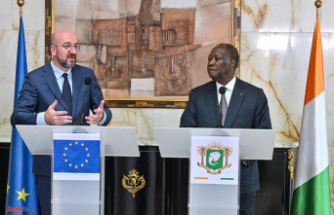The gas shortage is also putting municipalities and energy suppliers under pressure to save. Several cities and their municipal utilities in the region around Karlsruhe have joined forces to pool all the necessary strength and expertise. Not the only example.
Karlsruhe (dpa / lsw) - In view of the impending lack of gas in winter, the cities and municipalities of Baden-Württemberg are in energy-saving mode. Basically, everywhere in town halls people look to see where heating costs can be reduced, where lights can be switched off and how to get away from fossil fuels as quickly as possible.
In this context, seven northern and central Baden cities are now joining forces to reduce energy consumption by 20 percent. The goal is to get the public on board. The municipal utilities with their expertise such as consulting services on energy efficiency or the use of alternative energies should play their part.
Several mayors want to present what the whole thing should look like this Wednesday (11:00 a.m.) in Karlsruhe. In addition to Karlsruhe, the cities of Baden-Baden, Rastatt, Ettlingen, Rheinstetten, Bruchsal and Bretten are also participating in the project.
According to the City Association of Baden-Württemberg, there are similar mergers - some related to a district, some in loose cooperation - elsewhere, for example in the region around Ludwigsburg. The City Day has opened an exchange platform for members, where they can give each other ideas and ask questions.
Many municipalities in the south-west are also deciding or examining measures for themselves. The results are often very similar. "Any initiative that helps to sensitize all consumers to the topic and encourage them to save is good," said a spokeswoman for the city council.
In Stuttgart, for example, the municipal buildings are not to be heated permanently until November 1st this year. Before that, the heating is put into operation for a maximum of hours. This measure alone is said to reduce energy consumption by one percent. "We are hoping for the greatest energy savings when it comes to heating," explained Peter Pätzold, Mayor of Stuttgart for urban development, housing and the environment. The administration expects a further saving of two percent by lowering the target temperature during the heating period from 20 to a maximum of 19 degrees.
In addition, Stuttgart reduced the consumption of fossil natural gas by 35 percent at the beginning of the year and replaced it with so-called biogenic gas made from waste and residues such as paper waste. "With this strong conversion to biogenic gas, Stuttgart is taking on a pioneering role among major German cities," explained Mayor Frank Nopper recently.
Mannheim, for example, wants to lower the room and water temperature in the indoor pools by two degrees. "The pool heaters in the outdoor pools, which are operated with district heating, will be switched off," says a statement. Systems for regulating the room air would - as far as the pandemic situation allows - be set to the lowest possible energy consumption. In addition, the Stadtraumservice Mannheim, in coordination with the police, among others, is checking whether traffic lights could be switched off beyond the previous level.
Speaking of light: According to the city of Göppingen, it has almost halved its energy consumption for street lighting since 2015 by converting to light-emitting diodes (LED). In order to reduce it by a further 20 percent, consideration is now being given to extending the previously practiced "twilight service" from 11 p.m. to 5 a.m. to cover the entire night. "The brightness of the light is reduced without any clearly recognizable loss of comfort," explained the city. This is much more effective and practical to implement than, for example, switching off every second light.
In order to involve citizens, the city of Heidelberg will start a funding measure for mini solar systems on balconies and terraces in September. The city covers 50 percent of the costs up to a maximum of 750 euros. In order to help customers switch to a "CO2-neutral life", the Freiburg basic supplier Badenova is expanding a network of craftsmen and other partners in addition to its advisory services. This should ensure that the customer's "personal energy transition" can be implemented as comprehensively and quickly as possible.
To ensure that municipal utilities, as municipal suppliers, do not get into trouble due to rising gas prices, the Presidents of the City Council and Municipal Council, Peter Kurz and Steffen Jäger, recently appealed to Federal Minister of Economics Robert Habeck that they should be under the protective umbrella of the federal government.












